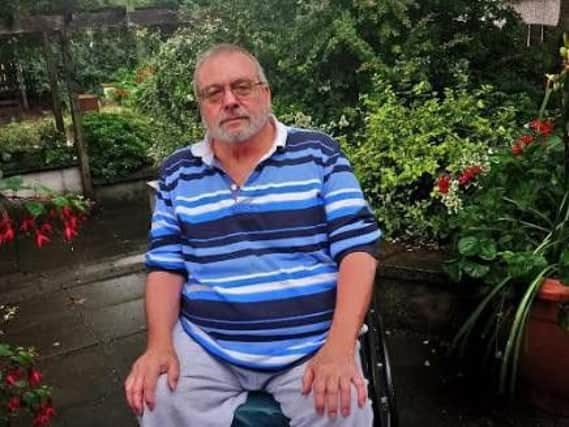Wakefield father-of-three left unable to walk following delay in sepsis treatment


Richard Saberton, who lives in Horbury, was admitted to Pinderfields Hospital displaying symptoms of suffering from sepsis.
He underwent a triage assessment which indicated the condition, but there was a delay in administering the correct antibiotics.
Advertisement
Hide AdAdvertisement
Hide AdA few days after his admission to hospital, Richard woke up unable to walk, with an onset of weakness in his arms.
He was sent for an MRI scan, where it was discovered that he had a spinal abscess. He was transferred to another hospital where he underwent decompression surgery.
Following his time in hospital, Richard instructed specialist medical negligence lawyers at national firm Irwin Mitchell to investigate his care.
Mid Yorkshire Hospitals NHS Trust, which runs Pinderfields, has admitted that Richard should have been treated according to the sepsis protocol which states that he should have started receiving intravenous antibiotics within “about one hour” of him being assessed.
Advertisement
Hide AdAdvertisement
Hide AdRachelle Mahapatra, partner medical negligence expert at Irwin Mitchell’s Leeds office, said: “Richard’s life and that of his family have been greatly impacted by what has happened to him.
“Through our work we sadly often see how quickly sepsis can take hold and how early detection and treatment are key to beating it.
“We are continuing to support Richard and his family so he is able to access the specialist care and support he needs to regain as much of his independence.
“We join him in marking World Sepsis Day in urging people to be aware of symptoms of the condition.”
Advertisement
Hide AdAdvertisement
Hide AdRichard started feeling unwell on November 3 2016. Within two days, he was taken to Pinderfields Hospital by ambulance, complaining of pain in his neck and both shoulders and struggling with confusion and difficulty speaking.
Following his assessment for sepsis, Richard should have been given treatment within 60 minutes of arrival according to the hospital’s triage protocol.
Instead, he waited almost three and a half hours for the IV antibiotics to be administered to him.
Following his paralysis, Richard underwent spinal injury rehabilitation at Pinderfields Hospital.
Advertisement
Hide AdAdvertisement
Hide AdNow, aged 69, he has retained the use of his arms, albeit he has weakness, but his legs remain paralysed.
No longer able to work, Richard is supported by his wife Lynn, 70, and his three children, Robert, 33, Richard, 32, and Sara, 30.
He said: “The last few years have been incredibly difficult for me. I can’t do a lot of the things I used to enjoy, like walking, cooking for my family, gardening or travelling.
“When I first became paralysed I was very ill and my wife stayed in the hospital with me overnight. After the surgery I spent time in the Intensive Care Unit and then High Dependency but I have very little recollection of it.
Advertisement
Hide AdAdvertisement
Hide Ad“When I started to get better, it dawned on me the consequences of what had happened.
“I wouldn’t have been able to get through the past few years if it hadn’t been for my wife and children; they’ve been so supportive.
“And while nothing will give me back the life I had before, all I can hope now is that I get the answers I need to move forward, and that lessons are learned to help ensure this doesn’t happen to anyone else.”
World Sepsis Day takes place on 13 September, with events held across the globe to help raise awareness of the disease, its symptoms and its effects.
Advertisement
Hide AdAdvertisement
Hide AdDr Ron Daniels BEM, Chief Executive of the UK Sepsis Trust, said: “Experiences like Richard’s remind us of the devastating effects of sepsis.
“Every year in the UK 250,000 people are affected by sepsis, and with every hour that passes before the right antibiotics are administered, the risk of death increases.
“Better awareness could save thousands of lives and, together, we can change the way sepsis is handled in the UK.”